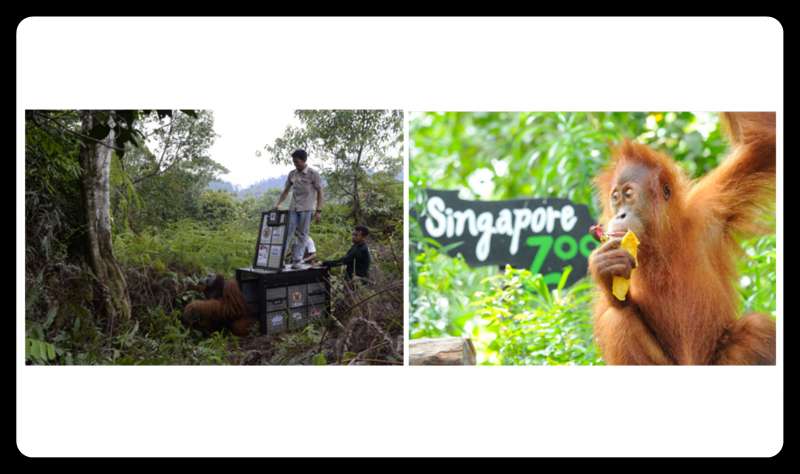

Singapore Save Wildlife
Conscientious travellers and wildlife lovers visiting Singapore this month can get involved with Endangered Species Day on 19 May, and support animal conservation across Asia.
As the world celebrates Endangered Species Day, travellers visiting Singapore this month can play their part in helping protect the region’s wildlife too! Through a stop at the Jurong Bird Park, Night Safari, River Safari, and Singapore Zoo, they can learn about wildlife conservation and support the multiple projects in place to safeguard endangered species around the region.
Human impact on the world has caused the rate of extinction for species in the twentieth century to rise to one hundred times the rate it would have been without human influence . Today close to 3,000 animal species are critically endangered, according to the International Union for Conservation of Nature (IUCN). Endangered Species Day is an opportune time for people of all ages to learn about the importance of protecting threatened animal species and the everyday actions they can take to help conserve them.
Wildlife Reserves Singapore (WRS) is running a series of campaigns to raise awareness of animal species in danger in Asia, including experiential learning journeys across its four eco-friendly wildlife parks. Dr Sonja Luz, Director of Conservation, Research and Veterinary Services at WRS, said: “A trip to our wildlife parks during a Singapore stopover or holiday offers travellers the opportunity to play a part in protecting some of their own endangered species back home. Aside from supporting our regional conservation projects, we hope visitors will pick up educational nuggets of information throughout the parks and learn about the small steps we can each take every day to protect the environment. From choosing sustainably-sourced and eco-friendly products to fighting climate change by being more energy efficient, there are lots of ways we can help conserve our natural habitats and in turn save endangered animal species
.”Animal lovers around the region can also join the WRS Go Green for Wildlife Campaign from their own home, by voting for additional conservation funds to be allocated to their favourite animal here. Wildlife Reserves Singapore will top up an additional 20 cents for every vote and share! Over 210 animal species on the IUCN Red List of Threatened Species are currently being sheltered by Wildlife Reserves Singapore (WRS) under optimum conditions to protect these vulnerable species. In addition, WRS has supported over 50 projects across the region in the last 10 years to tackle biodiversity loss.
Below is a list of the key conservation programmes and wildlife campaigns that WRS supports, with funds that come from corporate sponsors and profits from the parks including admission tickets, retail and food and beverage spend by guests.
Both giant pandas, Kai Kai and Jia Jia arrived in Singapore in 2012 as part of a 10-year loan presented by the Chinese government. Kai Kai and Jia Jia, housed at River Safari, are among the rarest bear species in the world. The joint collaboration between Wildlife Reserves Singapore and the China Wildlife Conservation Association helps to raise awareness of these vulnerable species. Efforts have been made to help contribute to the giant panda population, through a panda breeding programme at WRS. Over the years, with global initiatives established to address the dwindling number of pandas, there has been a positive rise in the population that has pushed its status away from being critically endangered. This remarkable change has raised hope for the other species that are under increasing threat.
There’s no slowing down when it comes to saving endangered animals. The Philippine Cockatoo, also known as the red-vented cockatoo, is a species endemic to the Philippines. This critically endangered species as it is suffering rapid population reduction due to extensive loss of its habitat and trapping for the cage bird trade. It is extinct in much of its historic range with only around 1000 birds estimated to remain in the wild. Together with Katala Foundation Inc, Jurong Bird Park supports the protection of the Philippine cockatoo on Rasa Island and its feeding habitats through involvement of local community and stakeholders. This project monitors the wild population of the cockatoo and increase knowledge, attitude and behaviour of local stakeholders and get them to participate in a Citizen’s Science programme to conserve this species. The Philippine cockatoo can be seen at the parrot paradise exhibit complex, at the Jurong Bird Park.
Stand amongst the giants at the Elephants of Asia habitat in Singapore Zoo. These majestic animals are given a number of enrichment devices that help to keep them physically and mentally active. With an estimated number of 2,000 Sumatran elephants left in the wild today, this critically endangered species is on the brink of extinction. Ongoing civil conflict and loss of habitat are threats to their population. The Way Kambas National Park in Sumatra is home to more than 10 per cent of the remaining Sumatran elephant population. Yet, the park presents a challenge for the safety of these elephants as illegal activities such as logging, poaching and land cultivation threaten their means of survival. Human-elephant conflict is also on the rise as local communities have expressed discontent towards the wild elephants due to damages done to crops, housing and property. In an effort to mitigate human-elephant conflict, WRS supports the Elephant Response Units (ERUs) in Indonesia to conduct forest patrols and herd wild elephants away from human dominated landscapes into the safety of protected forests. The collaboration also ensures that the National Park is well-supervised to protect the elephants from any harm.
Discover and marvel at close to 40 species of primates at Singapore Zoo – from the charismatic freeranging orangutans to the brilliantly coloured Douc langurs to the miniscule yet fearless cotton top tamarins. Ah Meng, the Sumatran orangutan is Singapore Zoo’s iconic animal that is dear to many. Sadly, the 6-year-old and her family are one of the 25 most endangered primates in the world. Due to agricultural expansion, much of the forest homes have been destroyed, leaving about a staggering 14,600 Sumatran orangutans left in the wild. Recently, their Bornean cousins were unfortunately, also placed on the critically endangered list, making the orangutan’s future look bleak. In response to the dire need of help, WRS supports the Human Orangutan Conflict Response Unit (HOCRU) which responds to conflict situations across northern Sumatra for the rescue and rehabilitation of these animals. Forest-adjacent communities affected by human-orangutan conflict (HOC) are offered training by HOCRU in best-practice methods of safely and humanely protecting their crops from orangutans.
This post was last modified on 19/05/2017 4:47 pm
Brownies are one of the most popular desserts around the world. You can make this…
People look up to prodigies and geniuses for their uncanny intellect. While the appeal of…
The Vizag Police authorities caught 212 kgs of Marijuana in two separate cases near Anandapuram…
Long-awaited metro rail projects in Visakhapatnam and Vijayawada are showing signs of real progress, as…
Through the never-ending work hustle, there are certain moments of joy, be it with your…
Semi-Ring Road Around Visakhapatnam: In a major infrastructure push, the Andhra Pradesh government has announced…
Leave a Comment